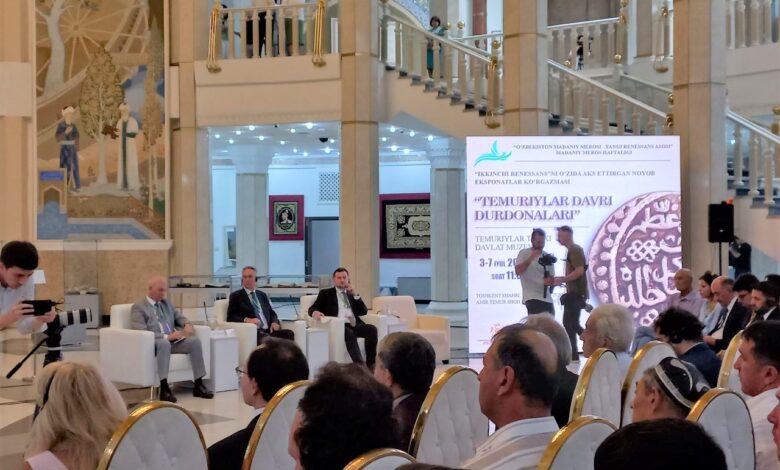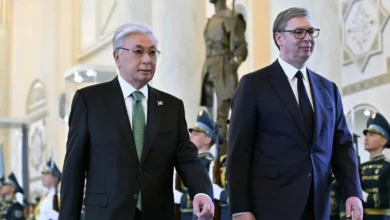
On July 3, 2023, at the initiative of the Ministry of Culture and Tourism of the Republic of Uzbekistan and the World Society for the Study, Preservation and Popularization of the Cultural Heritage of Uzbekistan, the Week of Cultural Heritage “Cultural Heritage of Uzbekistan – the Basis of a New Renaissance” and the International Week of Partnership Initiatives “New Uzbekistan: Development, Innovation and Education” started in Tashkent.
More than a thousand participants and guests from 60 countries of the world take part in the events, which will last until July 7, 2023.
The opening ceremony of the Cultural Heritage Week was held in the Event Hall in Tashkent. The event was attended by statesmen and public figures, representatives of international and foreign organizations, cultural and art figures, orientalists, as well as journalists and bloggers.
During the week, the museums of the capital of Uzbekistan will host a unique exhibition “Gold of Kushan”, exhibitions of the cultural heritage of the Timurid era, as well as masterpieces of folk applied art. The presentation of a book album and a documentary film “Treasures of the Kushan Kingdom”, prepared by the World Society for the Study, Preservation and Popularization of the Cultural Heritage of Uzbekistan, also will be held.
Along with all of these, a number of events will be organized: conferences, round tables, meetings and presentations.
As a part of the event, the World Society is holding an international forum “Historical Figures of Uzbekistan and Their Contribution to the Development of World Civilization”, which is to be held in Tashkent, Samarkand and Bukhara.
The opening ceremony of the Forum, which took place at the State Museum of Timurid History, was attended by First Deputy Speaker of the Legislative Chamber of the Oliy Majlis Akmal Saidov, Chairman of the Board of the World Society for the Study, Preservation and Popularization of the Cultural Heritage of Uzbekistan Firdavs Abdukholikov, President of the Turkic Academy Shahin Mustafayev, Managing Director of the Islamic Heritage Foundation Al-Furqan Sali Shahsivari, President of the Academy of Sciences of Turkiye Muzaffer Şeker, founder and President of the Timurid Association Frederic Beaupertuis-Bressan, Vice President of Marketing and Development of Mueller Publishing House & Schindler Alexander Wilhelm, as well as prominent scientists and experts in the study, preservation and popularization of cultural heritage.
The Head of the Turkic Academy said in his speech that the land of Uzbekistan has been the center of a developed culture and civilization for thousands of years. And it is no coincidence that in the era of the anti-colonial struggle in the Muslim World, a modern intelligentsia was formed in Uzbekistan and the Turkic world as a whole, showing itself as the leader of the modernization process in the East.
“Urban planning, agriculture, art and science have flourished in this ancient country for centuries. Great scholars such as Ibn Sina, al-Khorezmi, Abu Rayhan Beruni came out of these lands, who laid the foundation of the Islamic Renaissance. It is worth noting that this year we are celebrating the 1050th anniversary of Beruni’s birth.
The era of Amir Temur was marked by the activities of world-famous personalities such as Ulugbek, Alisher Navoi.
During the anti-colonial struggle, the Jadids and enlighteners, such as Ahmad Donish, Abdurrauf Fitrat, Mahmudhoja Behbudi, Abdullah Avloniy and others, gave a worthy response to the challenges of that hard times”, said Shahin Mustafayev.
In addition, on July 4, the Head of the Turkic Academy spoke at the conference of the same name, “Historical Figures of Uzbekistan and Their Contribution to the Development of World Civilization”. He stressed that the Turkic peoples, having harmoniously entered the Muslim civilization, became its active creators, along with other peoples, and made a significant contribution to the development of the entire East:
“Along with the great rulers, it is necessary to mention the names of the greatest thinkers of the Middle Ages who had a Turkic origin – such as Abu-Nasr al-Farabi, Ulugbek, Khoja Ahmed Yasawi, Yunus Emre, Nasimi, Navoi, Fuzuli and dozens of other names of great scientists, writers and spiritual ascetics who became the property of the entire world culture.
At the same time, the intellectual talent of the Turkic peoples, their ability to adapt to new changing historical conditions, was especially clearly manifested in the new time, when the advanced part of society among the Turkic peoples was at the forefront of the modernization trend in the East”.



